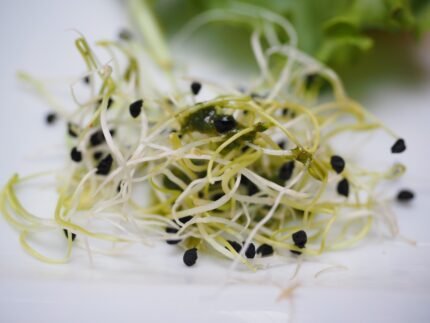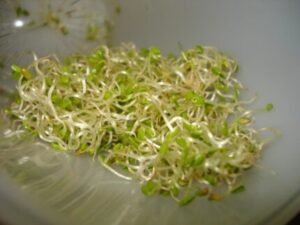Medically reviewed by Dr. Ramesh Gaddam, M.D. — Written by Sumalatha, D.N.H.E
Clover sprouts are tiny, young shoots that emerge from germinated clover seeds. These sprouts are typically derived from seeds of plants like alfalfa or red clover. The process of sprouting involves soaking the seeds and allowing them to germinate, leading to the development of small, tender shoots.
Clover sprouts are popular in salads, sandwiches, wraps, and other dishes, adding a crunchy texture and a mild, slightly nutty flavor. They are often included in various cuisines for their nutritional benefits and versatility.
Clover Sprouts Nutrition
Nutritional profile of clover sprouts per 100 grams:
| Nutrient | Amount per 100g |
|---|---|
| Calories | 23 |
| Protein | 4.0 grams |
| Carbohydrates | 2.1 grams |
| Dietary Fiber | 1.9 grams |
| Fat | 0.7 grams |
| Vitamins and Minerals | |
| Vitamin A (IU) | 1600 IU |
| Vitamin C | 11.0 mg |
| Vitamin K | 30.5 mcg |
| Folate (B9) | 36 mcg |
| Calcium | 32 mg |
| Iron | 1.5 mg |
| Magnesium | 27 mg |
| Phosphorus | 70 mg |
| Potassium | 180 mg |
Clover Sprouts Benefits

Like many sprouts, clover sprouts are known to be a nutritious addition to a balanced diet. Here are some potential benefits:
Rich in Nutrients:
Clover sprouts are a good source of essential nutrients, including vitamins (A, C, K), minerals (calcium, magnesium, potassium), and antioxidants.
Enzymes:
Sprouts, including clover sprouts, contain enzymes that may aid in digestion. These enzymes can help break down food and improve nutrient absorption.
Protein Content:
Sprouts are a source of plant-based protein. While the protein content varies, they can contribute to your daily protein intake.
Fiber:
Sprouts are a good source of dietary fiber, which supports digestive health and can help regulate blood sugar levels.
Low in Calories:
Clover sprouts are low in calories, making them a healthy choice for those looking to manage their weight.
Phytochemicals:
Like many plant-based foods, clover sprouts contain phytochemicals with potential health benefits. These compounds have antioxidant properties that may help protect cells from damage.
Potential Cardiovascular Benefits:
Some studies suggest that the antioxidants and other compounds in clover sprouts may contribute to cardiovascular health by reducing the risk of heart disease.
Detoxification:
Sprouts, including clover sprouts, are often associated with detoxification due to their ability to support liver function and help eliminate toxins from the body.
It’s important to note that while clover sprouts can be a nutritious addition to your diet, there have been occasional concerns about food safety related to sprouts.
Sprouts can harbor bacteria such as Salmonella and E. coli, which can cause foodborne illnesses. Therefore, it’s crucial to ensure that sprouts are properly cleaned and handled to minimize the risk of contamination.
As with any food, moderation is key, and individuals with specific health conditions or concerns should consult with a healthcare professional or a registered dietitian before making significant changes to their diet.
Clover Sprouts Side Effects

While clover sprouts are generally considered a healthy addition to a balanced diet, there are some potential side effects and considerations to keep in mind:
Risk of Contamination:
Sprouts, including clover sprouts, have been associated with foodborne illness.
The warm and humid conditions required for sprouting can also be ideal for the growth of bacteria such as Salmonella, E. coli, and Listeria.
To minimize the risk, it’s crucial to purchase fresh sprouts, store them properly, and follow safe handling practices.
Allergies:
Individuals with allergies to legumes or other related plants might be allergic to clover sprouts as well. Allergic reactions can include itching, swelling, hives, or more severe symptoms.
If you have known allergies, it’s advisable to consult with a healthcare professional before adding clover sprouts to your diet.
Oxalates:
Some individuals may need to moderate their intake of foods high in oxalates, as they can contribute to the formation of kidney stones in susceptible individuals.
Clover sprouts, like other sprouts, contain oxalates.
If you have a history of kidney stones or are at risk, it’s wise to monitor your oxalate intake.
Pregnancy Concerns:
Pregnant women are sometimes advised to avoid raw sprouts due to the risk of foodborne illness, which can have more severe consequences for pregnant individuals. Cooking sprouts can reduce this risk.
Thyroid Interference:
Clover sprouts, like other cruciferous vegetables, contain compounds known as goitrogens. In large amounts, goitrogens may interfere with thyroid function.
However, the levels of goitrogens in clover sprouts are generally low, and they are usually well-tolerated in normal dietary amounts.
As with any food, moderation is key, and individual responses can vary.
If you have specific health concerns or conditions, it’s advisable to consult with a healthcare professional or a registered dietitian before making significant changes to your diet, especially if you are considering incorporating clover sprouts.
Clover Sprouts Calories
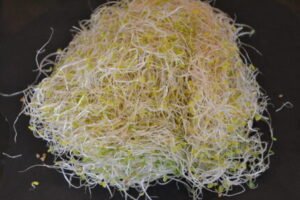
The calorie content of clover sprouts can vary slightly based on factors such as growing conditions and specific varieties. However, as a general estimate, here is the approximate calorie content of clover sprouts:
Clover Sprouts (per 100 grams):
- Calories: Around 23 calories
It’s important to note that clover sprouts are low in calories, making them a light and nutritious addition to salads, sandwiches, and various dishes.
Keep in mind that the caloric content can be influenced by factors such as added dressings or accompaniments in a specific recipe.
If you’re looking for precise nutritional information, it’s recommended to refer to specific product packaging or consult with a reliable nutritional database.
Clover sprouts vs alfalfa sprouts
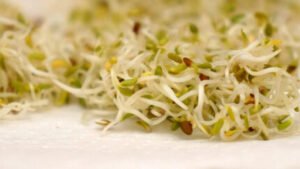
Clover sprouts and alfalfa sprouts are both types of edible sprouts that are often used in salads, sandwiches, wraps, and other dishes. While they share some similarities, there are also differences in taste, appearance, and nutritional content. Here’s a comparison between clover sprouts and alfalfa sprouts:
1. Plant Source:
- Clover Sprouts: Derived from clover seeds, such as red clover.
- Alfalfa Sprouts: Derived from alfalfa seeds.
2. Taste and Flavor:
- Clover Sprouts: Clover sprouts generally have a mild, slightly nutty flavor.
- Alfalfa Sprouts: Alfalfa sprouts have a mild and slightly peppery taste.
3. Appearance:
- Clover Sprouts: Clover sprouts typically have small, green leaves and thin stems.
- Alfalfa Sprouts: Alfalfa sprouts have tiny, delicate green leaves and a more delicate appearance.
4. Nutritional Content:
Both clover sprouts and alfalfa sprouts are low in calories and high in nutrients. They are good sources of vitamins (such as A, C, K), minerals (like calcium, iron, magnesium), and antioxidants.
The specific nutritional profile may vary slightly between the two, but they are generally considered nutritious additions to a diet.
5. Potential Health Benefits:
Both types of sprouts are associated with potential health benefits, including supporting digestion, providing antioxidants, and contributing to overall nutrient intake.
Some studies suggest that the compounds found in sprouts may have anti-inflammatory and cardiovascular benefits.
6. Food Safety Considerations:
Both clover and alfalfa sprouts have been associated with food safety concerns due to the risk of bacterial contamination during the sprouting process.
It’s important to handle and store sprouts properly and, in some cases, cook them to reduce the risk of foodborne illness.
7. Availability:
Availability may vary depending on the region and local preferences. Both types of sprouts are commonly found in grocery stores and health food stores.
Ultimately, the choice between clover sprouts and alfalfa sprouts comes down to personal preference in terms of taste and texture.
Including a variety of sprouts in your diet can provide a range of nutrients and flavors. If you have specific health concerns or dietary restrictions, it’s always a good idea to consult with a healthcare professional or a registered dietitian.
Taste of Clover Sprouts
Clover sprouts have a mild and slightly nutty flavor. The taste is generally subtle, making them versatile for use in various dishes.
The mildness of clover sprouts allows them to complement other ingredients without overpowering the overall taste of a dish.
This makes them a popular choice for salads, sandwiches, wraps, and other recipes where a delicate and fresh flavor is desired.
Because of their mild taste, clover sprouts can be used to add a refreshing and crunchy element to dishes without significantly altering the overall flavor profile.
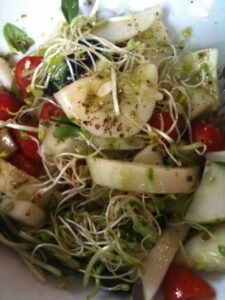
Many people appreciate their crisp texture and subtle nuttiness, making them a favorite in salads or as a garnish.
It’s worth noting that individual taste preferences can vary, so some people may describe the flavor in slightly different ways.
If you enjoy experimenting with different textures and flavors in your meals, incorporating clover sprouts can be a delightful way to enhance the overall eating experience.
Medically reviewed by Dr. Ramesh Gaddam, M.D.

General Physician, Diabetologist, and Critical Care Specialist.
Discover more from Health Build-Up
Subscribe to get the latest posts sent to your email.
